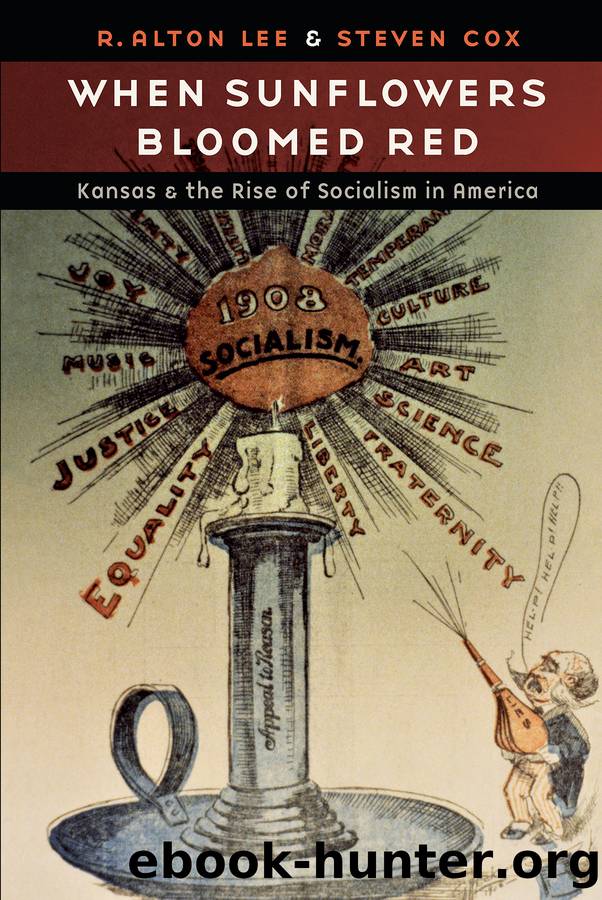When Sunflowers Bloomed Red by R. Alton Lee & Steven Cox

Author:R. Alton Lee & Steven Cox [Lee, R. Alton & Cox, Steven]
Language: eng
Format: epub
Tags: HIS036090 History / United States / State & Local / Midwest (ia, Il, In, Ks, Mi, Mn, Mo, Nd, Ne, Oh, Sd, Wi), POL010000 Political Science / History & Theory, POL042040 Political Science / Political Ideologies / Radicalism
Publisher: University of Nebraska Press
6
The Wobblies
The Socialist tenacity of opposition to militarism and World War I was a tribute to their dedication to principle but produced terrible results for individual party members and radical groups. The Industrial Workers of the World (IWW), commonly called âWobblies,â was an international union of revolutionary Socialists who were willing to use violence to achieve their ends. When they put their principles into action, their efforts were crowned by being punished severely by a Kansas culture caught up in the throes of political reaction. When America entered the war in April 1917, the official threat to Socialists from officials deepened. With opinion divided over American participation in the âcapitalistâ war because of losses in the Atlantic in the defense of neutral rights, President Woodrow Wilson determined to unite the nation through the Creel Committee. Chaired by Denver journalist George Creel, the Committee on Public Information became a powerful weapon in turning the European war into the âGreat Crusadeâ for the American people, igniting a religious fervor in the public mind that boded ill for the Wobblies. The story of the Industrial Workers of the World belongs in a chapter by itself between the winning and the losing Socialists because, while never as successful as the winners, the union made a huge contribution to the welfare of those desperate migratory harvest and oil workers it tried to help.
Eugene Debs, along with Daniel De Leon, William âBig Billâ Haywood, and others, founded the IWW in Chicago, and the organization, with its radical approach to socialism, had a special appeal to the lumberjacks and miners of the Northwest, eastern textile workers, lumberjacks in Louisiana, and migrant agricultural and petroleum workers on the Great Plains. With the discoveries of natural gas and oil in Kansas, these workers flitted between following the wheat harvest and working the oil fields. Debs soon left the IWW, and Haywood assumed leadership of the organization after the Socialist split in 1912 over the use of force, along with his violence-prone Western Federation of Miners.1
The Wobblies sought to unite all workersâblack and white, male and femaleâunder the motto that the working class and the employing class had nothing in common. Like all Socialists, they believed capitalists were parasites living off the labor of others and their system must be overthrown and a classless society established. The workers would own and control the means of production and distribution, and laborers would then enjoy the fruits of their labor. Debs left the IWW over the use of sabotage to achieve its ends of revolutionizing the capitalist system. By this the organization meant pacific resistance to capitalism, but even this was too much for Debs and mainstream Socialists, who insisted the ballot box was the true means to the end. The IWW insisted they were âat war against warâ and opposed violence, but as the public attitude became increasingly reactionary, Kansas patriots concluded they were violent atheists and godless radicals. Their transient nature, of course, made them âmore vulnerable to harassment and repression.
Download
This site does not store any files on its server. We only index and link to content provided by other sites. Please contact the content providers to delete copyright contents if any and email us, we'll remove relevant links or contents immediately.
| Anarchism | Communism & Socialism |
| Conservatism & Liberalism | Democracy |
| Fascism | Libertarianism |
| Nationalism | Radicalism |
| Utopian |
The Secret History by Donna Tartt(19092)
The Social Justice Warrior Handbook by Lisa De Pasquale(12191)
Thirteen Reasons Why by Jay Asher(8912)
This Is How You Lose Her by Junot Diaz(6889)
Weapons of Math Destruction by Cathy O'Neil(6281)
Zero to One by Peter Thiel(5802)
Beartown by Fredrik Backman(5756)
The Myth of the Strong Leader by Archie Brown(5509)
The Fire Next Time by James Baldwin(5448)
How Democracies Die by Steven Levitsky & Daniel Ziblatt(5219)
Promise Me, Dad by Joe Biden(5154)
Stone's Rules by Roger Stone(5088)
A Higher Loyalty: Truth, Lies, and Leadership by James Comey(4964)
100 Deadly Skills by Clint Emerson(4927)
Rise and Kill First by Ronen Bergman(4790)
Secrecy World by Jake Bernstein(4753)
The David Icke Guide to the Global Conspiracy (and how to end it) by David Icke(4720)
The Farm by Tom Rob Smith(4514)
The Doomsday Machine by Daniel Ellsberg(4490)
